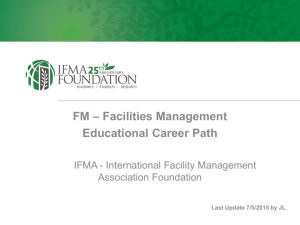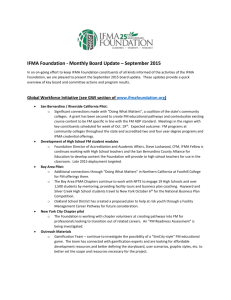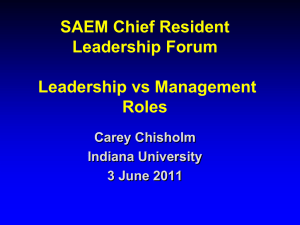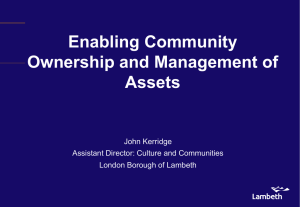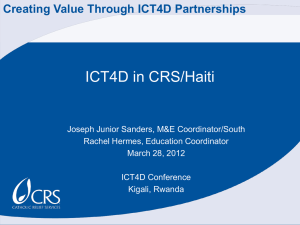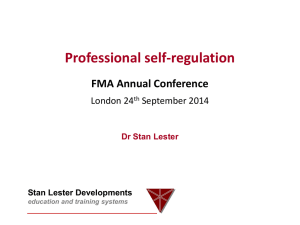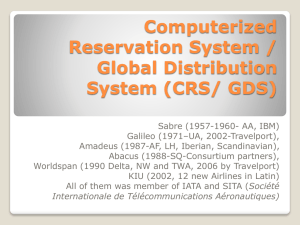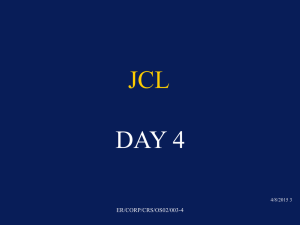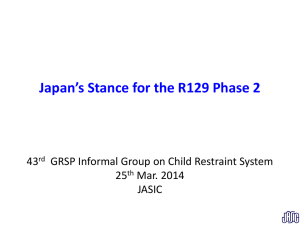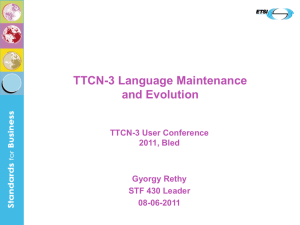The Profession of Facility Asset Management
advertisement
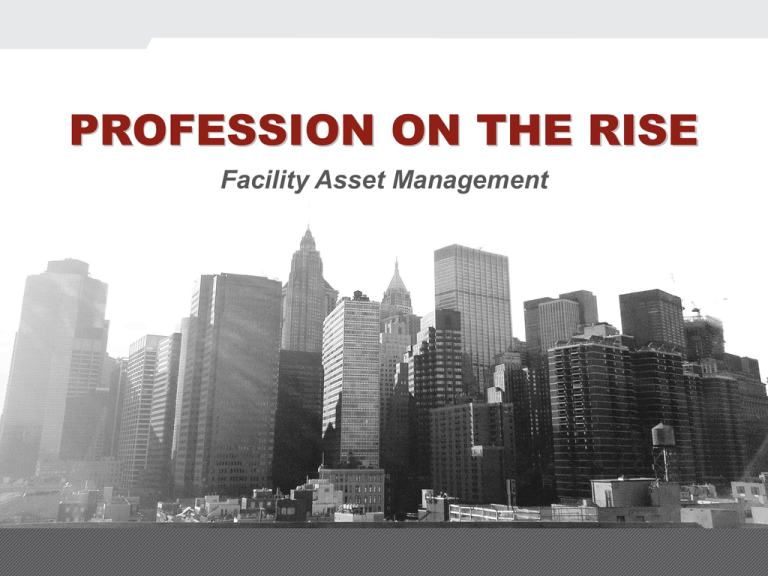
PROFESSION ON THE RISE Facility Asset Management Facility Asset Management Dr. Sarel Lavy Associate Professor & Graduate Program Coordinator Department of Construction Science College of Architecture Texas A&M University Jeffrey J. Tafel, CAE Executive Director IFMA Foundation John A. Garcia Managing Director of ALPHA Facilities Solutions President, Texas A&M University Facility Management Industry Advisory Council AGENDA The Profession of Facility Asset Management History Academia Skills and Knowledge The Job The Career HISTORY The Profession of Facility Asset Management John A. Garcia Clarity Over Time Professional Associations 1857 American Institute of Architects 1934 National Society of Professional Engineers 1980 International Facility Management Association 1982 Construction Management Association of America Comparison Construction Management Project Delivery Perspective Facility Management Facility Asset Management Operational Technical & Logistics Efficiency Perspective Return on Investment Perspective A Strategy for Making Better Decisions at Lower Risk and Costs – By Commander James J. Dempsey PE, USCG “Facility asset management (FAM) is a field of management that umbrellas all decisions related to facility investments to specifically include acquisition, construction, operations, maintenance, renewal and disposal ... Where traditional facilities management seeks to ensure the proper working order of a facility portfolio, FAM fully embraces this field and further incorporates economics; financial, capital and resource management; and the direct application of many decision and information management practices.” … FAM fully embraces [facilities management] and further incorporates economics; financial, capital and resource management … Provided for the Federal Facilities Council’s Forum October 31, 2006. Engineering, Construction, and Facilities Asset Management: A Cultural Revolution FACILITY ASSET MANAGEMENT DOCTRINE ACADEMIA The Profession of Facility Asset Management Dr. Sarel Lavy Growing Opportunity Facility Management The CRS Center The CRS Center began operations in 1990 with an endowment from the Texas based architecture firm Caudill Rowlett Scott The Center’s activities focus on the generation and dissemination of knowledge, education and service to professions concerned with the design, construction and management of the built environment At the core of the Center’s philosophy is the concept that … The CRS Center Bill Caudill, FAIA The CRS Center And … Bill Caudill, FAIA Facility Management Program • The FM Program formally began in 1999 with a graduate certificate in Facility Management administered by the CRS Center. The certificate is available to any student enrolled in a graduate degree program at Texas A&M University • The program has awarded 69 certificates to date • An academic minor in Facility Management was approved by Texas A&M University for introduction and that program joined its elder sibling in Fall 2013. The minor is administered by the department of Construction Science in conjunction with the CRS Center and current enrollment is at 24 students • The first students are expected to graduate with a minor in Spring 2015 • The Facility Management program relies heavily on the expertise, guidance and generosity of a Facility Management Industry Council Facility Management Programs Undergraduate Minor (administered by Dept. of Construction Science) Requirements • • • • • Minimum 18 credit hours (6 hours of required courses, 12 hours of elective courses) Minimum 6 credit hours at 300, 400 level No more than 6 credit hours can be double counted between student’s major and the FM minor At least 2 courses (6 credit hours) must be taken outside student’s major area Student must make a “C” or better in all courses for the minor Facility Management Programs Graduate Certificate (administered by the CRS Center) Requirements • • • • • • Minimum 15 credit hours of FM coursework (3 hours of required courses, 12 hours of elective courses) Minimum 6 credit hours of required coursework (3 credit hours of COSC 670, Facilities Management, and 3 credit hours of capstone course) At least 6 credit hours (2 courses) must be from one of the four major areas; O&M, Finance & Real Estate, Human/Environmental Factors, Planning, Management & Technology At least 1 course (3 credit hours) must be taken outside student’s major area Student must be enrolled, in good standing, in a graduate degree program at TAMU Facility Management Programs Graduate Student Research Projects demonstrate two signature areas of excellence in FM @ A&M Sustainability and Modeling, Simulating & Managing Building Information (BIM for FM) EXAMPLES … Sustainability Campus BIM – FM Opportunities Annual event, 16-17 October IFMA Student Chapter Scholarships Internships/Mentoring Guest Lectures Contact Information Sarel Lavy, PhD, M.ASCE Associate Professor of Construction Science Associate Director, CRS Center Ph: 979.845.0632 Fax: 979.862.1572 email: slavy@arch.tamu.edu Valerian Miranda, PhD, FIIA Wallie E. Scott Jr. Professor of Architectural Practice & Management Director, CRS Center email: v-miranda@tamu.edu CRS Center for Leadership & Management in the Design & Construction Industries College of Architecture, Texas A&M University College Station, TX 77843-3137 Ph: 979.847.9357 Fax: 979.862.2235 email: crscenter@tamu.edu Web: crscenter.tamu.edu OPPORTUNITIES: SKILLS and KNOWLEDGE The Profession of Facility Asset Management Jeffrey J. Tafel Foundations for Success IFMA Foundation The IFMA Foundation works for the public good in support of Facility Management higher education, students studying Facility Management and related fields, research critical to the profession, and increasing awareness of facility management and making FM a career of choice The expanding FM Workforce Gap Did you know… For AT&T, there are approx. 1,000 FM (management) professionals The approximate numbers of qualified retirements: ~ In 5 years = 350 personnel (35% of workforce) ~ In 10 years = 700 personnel (70% of workforce) There are approximately 2,000 students enrolled in IFMA Foundation accredited degree programs worldwide Global Workplace Workforce Initiative Connecting: Business Business GWWI Economic Development Government Education Academics Government Economic Development Practitioners Students and Parents Global Workplace Workforce Initiative CONNECT Act as Connector and work with Sector Navigators connecting business, local chapters, councils, higher education, K-12, STEM, government, economic development, students, parents EDUCATE Offer IFMA “essentials” content to STEM, STEAM, ACE and other school programs. Train teachers and guidance counselors in FM. Provide “A Day in the Life of an FM” experience. Provide training to those entering FM from other occupations ENGAGE Excite students about FM with the Mars City Project. Engage students and parents with facility tours, presentations, chapter involvement, and new student chapters INVEST Invest in student scholarships, internships, externships, mentorships, job fairs Current Foundation Programs Three major focus areas: 1. Accreditation of FM Degree Programs 2-year, 4-year, and graduate FM degrees 2. FM Student Programs: Scholarships, FM Student ‘Pipeline’ initiative, E-Poster competition, International Student of the Year competition 3. Research on the profession (future focused) Accredited Degree Programs (ADPs) 30 Facility Management Degree Programs 11 Graduate Degrees 16 Undergraduate (4-year) Degrees 3 Undergraduate (2-year) Degrees International Reach USA: 15 Canada: 1 Europe: 10 Asia/Australia: 4 FM ADP Growth Accredited FM Degree Programs Worldwide 30 25 20 15 10 5 0 2008 2009 2010 2011 2012 2013 Accredited Degree Program FM ADP: What is it? An Accredited FM Degree Program ensures our profession’s vital core competencies are embedded into the institution’s academic coursework Accreditation is a voluntary method / process of quality assurance used by universities and institutions designed primarily to distinguish schools adhering to a set of educational standards The Foundation’s FM Accredited Degree Program (ADP) ensures current students, potential employers, parents and prospective students that the accredited FM degrees meet the rigorous academic standard for quality, subject content and student outcome requirements ADP Standard Updated ADP Standard released early 2014 Based on IFMA’s most recent Global Job Task Analysis (GJTA) which defined the 11 core competencies of the FM profession Facility managers from 62 countries were involved in the GJTA, the most comprehensive to date and the first truly global survey and analysis FM Core Competencies Communication: communication plan and processes for both internal and external stakeholders Emergency Preparedness and Business Continuity: emergency and risk management plans, procedures Environmental Stewardship and Sustainability: sustainable management of built & natural environments Finance and Business: strategic plans, budgets, financial analyses, procurement Human Factors: healthful & safe environment, security, employee development FM Core Competencies Leadership and Strategy: strategic planning; organize, staff and lead facility organization Operations and Maintenance: building operations and maintenance, occupant services Project Management: oversight and management of all projects and related contracts Quality: best practices, process improvements, audits and measurements Real Estate and Property Management: real estate planning, acquisition, disposition. Technology: facility management technology, workplace management systems. Updated ADP Standard Describes both scholarly and real-world facility management applications and practices Provides a comprehensive model for an ideal facility management program The Facility Management Accreditation Commission establishes student-based outcomes for accreditation Achieving those outcomes is not defined by any empirical measure, but rather by demonstrating competencies through assessment defined within those outcomes Each program is encouraged to retain its uniqueness while providing the basic curricular structure needed to assure that its graduates are truly prepared for real-world careers in facility management Updated ADP Standard Recognizes the importance of variation and diversity in program offerings Institutional acknowledgement that facility management is a profession that has come of age and has clearly definable professional competencies that translate into academic program outcomes Academic FM Research Academic and Research Track at WW The Academic & Research track is a “double blind” peer review initiative to allow Academics and Researchers the opportunity to present and discuss Facility Management, the Built Environment and related topics Goal: Gain expanded understanding of the research priorities and methods employed All abstracts and full papers are double blind peer reviewed by a panel of highly qualified Academics / Researchers with expertise in topic areas 30 such papers and presentations are expected for World Workplace 2014 in New Orleans FAM - The JOB The Profession of Facility Asset Management John A. Garcia Boiler Room to Boardroom FAM Leadership Responsibilities GOALS Build or Enhance a Facility Asset Management System Efficiently Protect and Enhance Functionality and Quality Foster Accountability For Stewardship Strategically Prioritize and Allocate Resources for Maintenance, Repair, Renovation and New Construction OBJECTIVES Outline a process and services to accomplish the goals Provide a proposal for the outlined process Provide an overview presentation of the information for an executive leadership decision presentation on – date – Facility Management Processes Facility Asset Management Knowledge Development Process Understand Where You Are Today Understand Where Improvement Can Be Made Improve Information Knowledge Base Improve Decision Making Desired Outcome Facility Information Management Strategies Foster Accountability For Stewardship Adopt standardized budgeting and cost accounting Establish facilities steering group Establish facilities performance measures Empower facilities program managers by providing incentives and removing organizational barriers Strategically Allocate Resources for Facility Asset Management Incorporate a facilities component in strategic plan Establish and refocus condition assessment program Make Priorities and business rules for project definition Create design guide and performance specifications The CAREER The Profession of Facility Asset Management John A. Garcia FAM Career Path Responsibility THANK YOU
